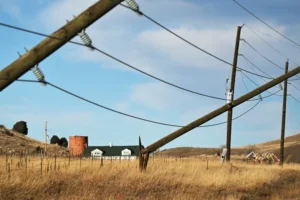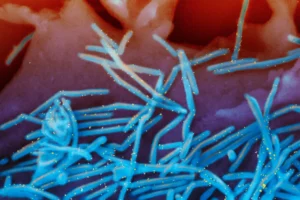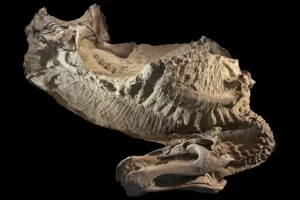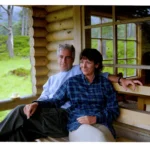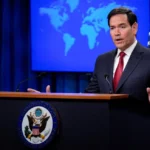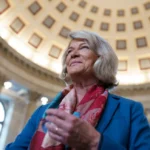University of Wyoming Concludes Academic Year with Progress and Future Plans
‘Real impacts on the state’
- Published In: Other News & Features
- Last Updated: May 07, 2023

University of Wyoming President Ed Seidel keeps the five objectives from the UW Strategic Plan 2023+ and his goals for the school in view on a white board next to his desk. (Wyoming Truth photo by Kaycee Clark)
By Kaycee Clark-Mellott
Special to the Wyoming Truth
LARAMIE, Wyo.—As the University of Wyoming (UW) prepares to graduate its 2023 spring class on May 13, it’s time to look back on the initiatives President Ed Seidel launched and the progress that was made during the 2022-23 academic year.
Last August, Seidel spoke with the Wyoming Truth about his four priorities: institutional excellence, student success, service to the state and financial sustainability. The priorities were implemented into UW’s Strategic Plan 2023+, along with the objective of fostering a supportive campus community. The plan, which was approved in January, established the university’s directives for the foreseeable future, as it did not include an end date.

Seidel’s contract was approved for a three-year extension, making him the first UW president since 2013 who will serve a second term. He also developed five goals aligned with the objectives of the strategic plan: student excellence, personnel investment and engagement, external relationships, long-range and strategic planning and budget priorities.
“[The objectives and goals are] not exactly the same… on my whiteboard there in black are specific execution strategies, things we need to actually do,” Seidel said during an interview with the Wyoming Truth. “We have working groups going through each of these things to determine how we will achieve those high-level goals.”
Here is an update on the initiatives UW introduced last fall—and where they’re headed.
Ensuring student success
Saddle Up, a preparation camp for new students, will return in August with adjustments that include an extension of the lunch period and a reduction in the number of classes. UW Provost Kevin Carman noted these changes could seem “trivial” to some, but they have been made in response to students’ suggestions.
Early results for student retention seem promising. According to Carman, of the 1,423 students who participated in Saddle Up last fall, 93.1% returned for the spring semester. In contrast, only 86.1% of the 165 nonparticipants returned.
“In our world, that’s a huge difference,” Carman said. “We’re encouraged to see that initial positive impact of the program, and then of course, we’ll continue to follow it over time and make revisions and improvements.”
The provost also highlighted the launch of the Navigate app, which was designed to track students’ progress toward degree completion and assist in academic advising. The app uses UW data to monitor and show indicators of a student’s failing grades.
Working toward Carnegie classifications
UW has progressively pursued achieving classifications as a Carnegie Research 1 (R1) University and Carnegie Community Engaged University. The R1 classification is determined by the Carnegie Foundation every three years; the last one occurred in 2021.
Several of the platforms in UW’s Strategic Plan 2023+ are aimed at advancing UW toward this goal.
“I would say in the next few to half a dozen years, we ought to be able to achieve [R1 classification],” Seidel said.
UW has made some progress by correctly reporting research expenditures and restructuring the Office of Research and Development. During National Lab Day last month, members of the U.S. Department of Energy and all 17 national labs visited campus to explore “how UW can partner with the Department of Energy,” Seidel said.
To achieve status as a Carnegie Community Engaged University, UW is required to engage with the state as its only four-year institution. Carman said that across Wyoming, UW assists in “rural health needs and telehealth,” as well as nutrition and dietetics at the Wind River Reservation. A separate application for this classification recently was submitted, and a decision is expected by December.
Fostering a supportive community
A new objective in the strategic plan — “providing a supportive community” — emerged following Seidel’s August interview. This addition became relevant in December when a local church elder targeted a transgender student by putting the individual’s name on a sign in the Wyoming Union and identifying her as a male. Questions of inclusivity and freedom of speech arose after the elder was banned from the Union for a year.
In response to UW’s handling of the incident, the LGBTQ community held a silent demonstration outside the Union. Many participants said they feared for their safety, with one student, Antonio Roman, saying he was “willing to take a bullet” for the community.
Carman understands the community’s concern: “Knowing that there are people out there that don’t understand you, that don’t want to try and understand you, and have the potential for doing harm; we all read the newspaper and see what’s happening daily across the country.”
“I find that unsettling myself,” Carman added. “But what we need to do is to continue to demonstrate our support for our diverse community, including the LGBTQ community, and listen to them, hear their concerns and do what we can to help address those concerns.”
To ensure a safe campus environment, Seidel said police will be present at events where different views are expressed He acknowledged that not all students and community members may want police at these events, but noted UW has met with both campus and Laramie police to determine best practices to move forward.
Seidel also created the President’s Freedom of Expression Working Group. It meets weekly to engage in a “healthy dialogue” of broad viewpoints that range from “very conservative to very liberal,” according to Carman, who is a member of the group.
In January, UW appointed Zebadiah Hall as the first vice president for diversity, equity and inclusion. Hall will serve in Seidel’s cabinet with direct responsibilities as a point of contact for the Native American Affairs Advisory Council and the Black 14 initiatives. Additionally, he will help form a campus climate team and work with the Social Justice Research Center.
UW’s future
The university will conclude its reorganization of schools by July 1, with what Carman described as “positive feedback” from faculty and no concerns from students. Additionally, the School of Computing, currently incubating in the College of Engineering and Applied Sciences, is hiring faculty and developing curriculum for a minor in computing that will be offered in the fall.
Meanwhile, construction on UW’s two new residence halls also has begun; the projects are fully funded and are expected to be completed by fall 2025. The new Ivinson Parking Garage, also under construction, is on target to open at the end of spring 2023.
Reflecting on the progress that’s been made this year, Seidel believes the future of UW is bright.
“I remain very excited about being in this role, and I’m pleased with where we’re going,” he said. “The legislature was very kind to us in this last year, and we’re going to make very good use of that and move the university forward in ways that are going to have real impacts on the state.”


